Keeping Tsars Out of Power
A Russian Protest, a #SpecialMilitaryOperation, and a Date I've Had for a Long Time
Good Evening:
In his last public request, Aleksei Navalny instructed Russian opposition voters to vote en masse at noon on Sunday—a show of force that would be lawful, even in Vladimir Putin’s rigged election, but nonetheless a powerful show of opposition as large numbers of people turn up at a specified time. The idea would be to spoil ballots, so as not to lend legitimacy to Putin’s sham election, but also have a mass presence that authorities could not prevent or crack down upon.
So today at noon, I went down to my local Russian polling station, which was—of course—just inside the #GatesOfHell in the Russian embassy compound on Wisconsin Avenue. As noon approached, an impressive crowd gathered to “vote,” their Russian passports in hand, a great many of them also carrying the blue and white flag of the Russian opposition. Many were also carrying handmade signs. One acquaintance of mine carried around the above mock ballot, which has two non-Putin candidates checked (so that the ballot will be discounted) and the phrase “But the Tsar is illegitimate!” scrawled across the line for Putin himself.
“They’ll count it for Putin anyway, of course,” she assured me.
Here are some pictures of the crowd:
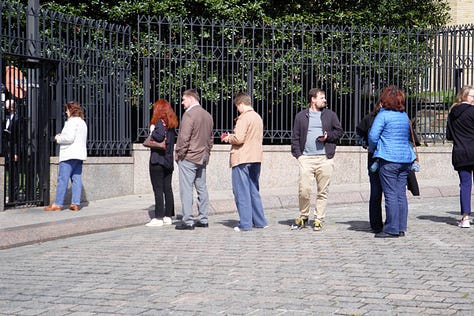
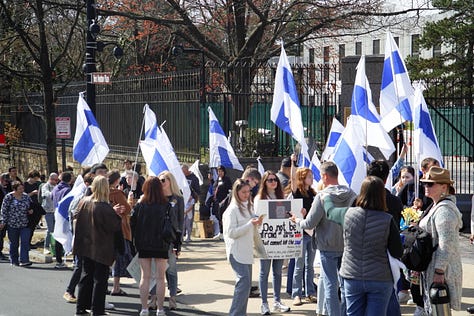



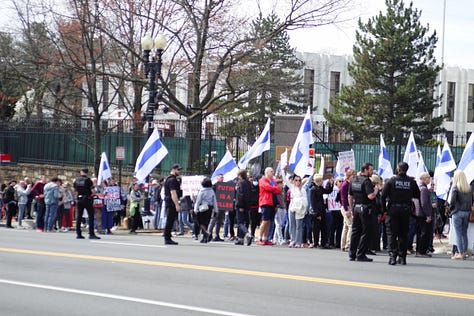

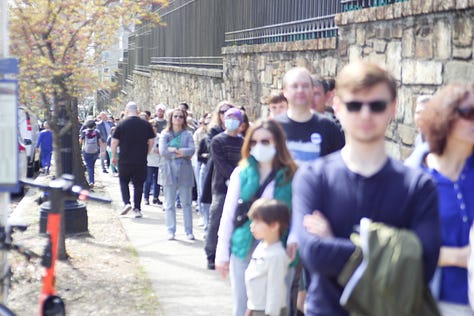
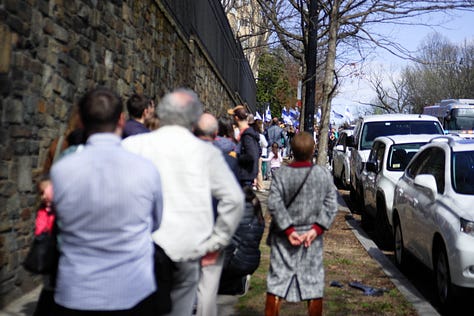
And here are some pictures of the signs they carried:


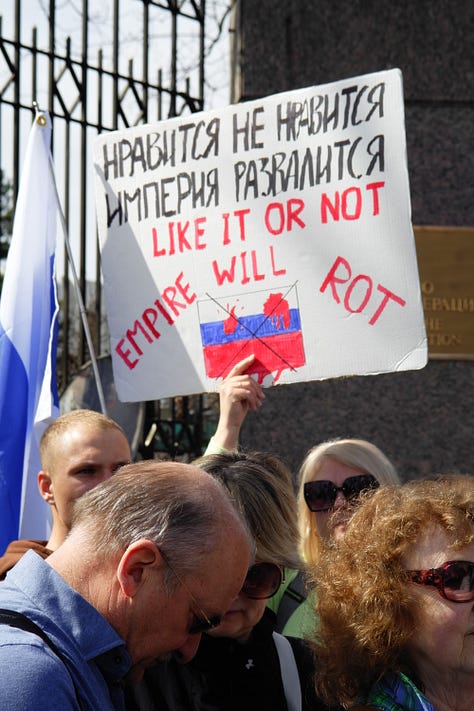
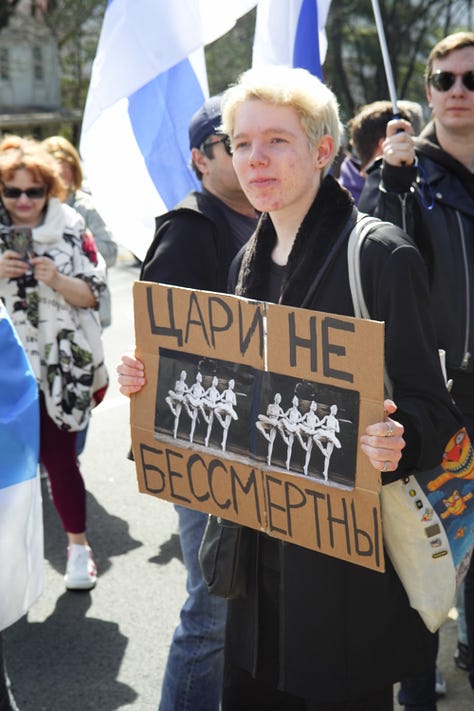

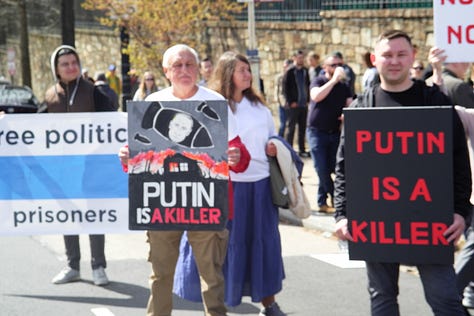
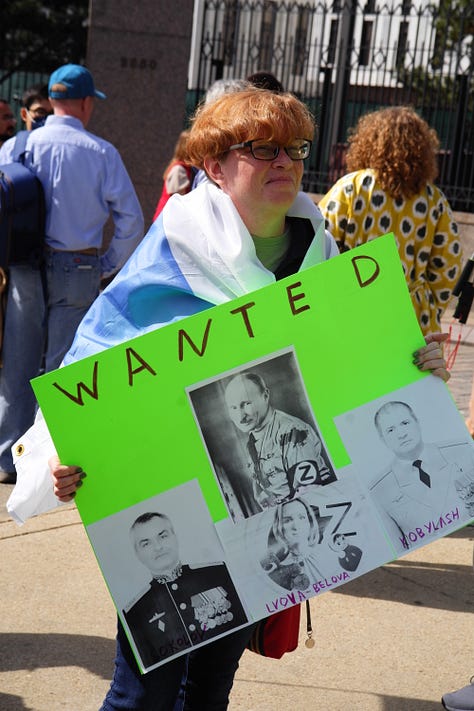
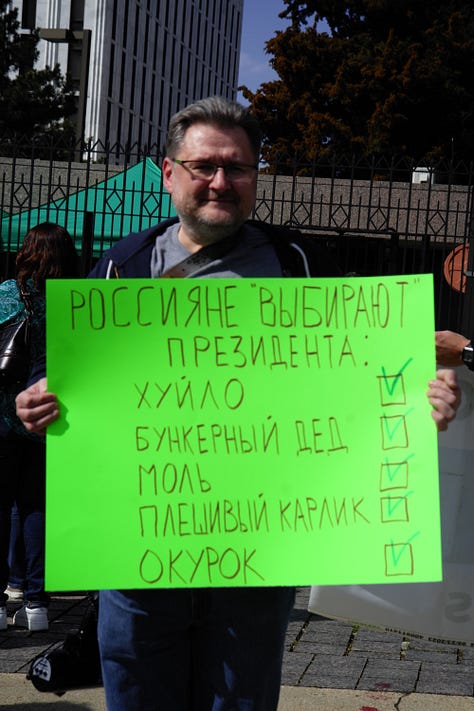
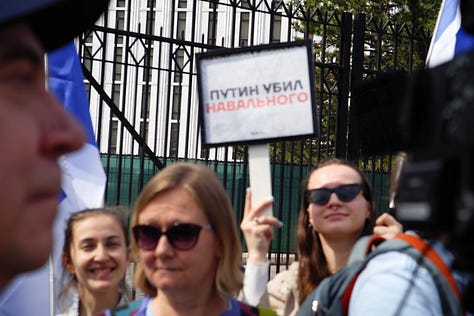
One says, “Tsars are not immortal.” Another says “Putin killed Navalny.” One of the most creative offered its own mock ballot, which reads: “Russians elect a president” and offers five options, all of them checked: “Dickhead,” “Bunker Grandfather,” “Mole,” “Bald Dwarf,” and “Cigarette Butt.”
If it hadn’t been broad daylight, I would have projected in their honor.
Of all the pictures I have ever taken at a #SpecialMilitaryOperation, this one—shot last night—may be the most powerful:
It requires no explanation to any Ukrainian, but it probably does for American readers. Two years ago yesterday, the Russians shelled the drama theater in Mariupol, where are large number of civilians were sheltering. Hundreds were killed. To try to prevent an attack on the theater, the Ukrainians had written the word “deti” (“ДЕТИ” in Russian), which means “Children,” in giant block letters in the theater’s parking lot. The idea was to communicate clearly that children were sheltering in the theater. Here’s a satellite image of the theater before the attack with the word in large lettering both in front and in back:
On the two-year anniversary of the attack, it seemed only appropriate to cover the front of the Russian embassy with the word in similarly bold lettering. The “Z” and “V” spotlights, projected as always by the embassy staff in an attempt to interfere with my projections, in this case create a dramatic counterpoint. They are, after all, symbols of Russian militarism—the very militarism that killed the children in that theater.
On a lighter note, as long as I was projecting yesterday, it seemed only appropriate to thank Ambassador Antonov for bestowing on me the great honor of placing me on the Russian sanctions list last week. I made this Instagram reel of the projection:
And this one too:
Today’s #BeastOfTheDay are these sea lions, who showed these beach goers whose beach this really is:
Trump Trial Diary, March 17, 2024
Donald J. Trump and I have had this date for a long time.
In some ways, I think, we have had it since just over eight years ago, when I wrote an article about candidate Trump entitled, “Trump as National Security Threat.” It was, I believe, the first detailed exploration of the idea of Trump posed a threat to the country we needed to think about in national security terms. In that article, I laid out seven reasons I thought Trump posed a serious threat, even as a major party candidate, let alone as actual president.
Once you label someone a national security threat, you begin to think about ways to neutralize that threat, and criminal prosecution is one way our system has of doing that. Not the only way, to be sure, but one way. And it seemed a means that was plausible in Trump’s case. He had these shady dealings with the Russians. He lied constantly. And, well, he acted like a gangster.
And so I began following the many legal travails of candidate Trump, then President Trump, then former-President Trump, and now would-be President Trump.
At some level, I have always believed—known, even—that he would be the first president ever criminally tried. And I have always known that I would be there. It’s not so much that I have rooted for this outcome or hoped for it. It’s that I have always suspected it was the only place the clash between the man’s personality and the presidential office—a matter about which Susan Hennessey and I wrote a whole book—could lead.
It will be a drama in four acts.
Keep reading with a 7-day free trial
Subscribe to Dog Shirt Daily to keep reading this post and get 7 days of free access to the full post archives.








